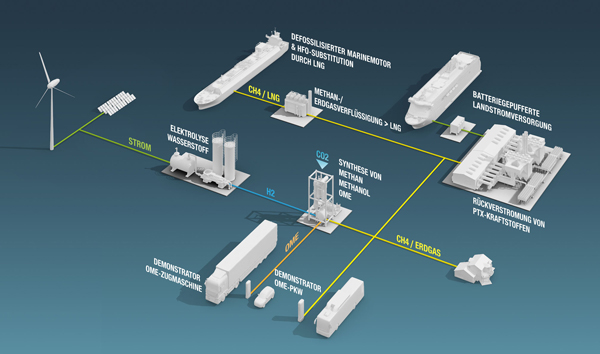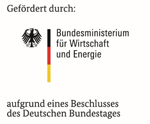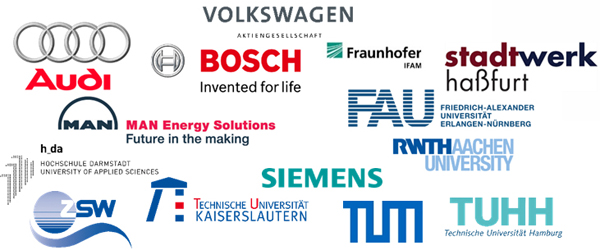E2Fuels
The joint project "E2Fuels" aims to research synthetic fuels. On the one hand, this involves optimizing the production of synthetic fuels and, on the other, applying the fuels in mobile, industrial and maritime systems. In the E2Fuels project, the focus is not only on hydrogen produced by water electrolysis, but also on fuels such as methane (CH4), methanol (CH3OH), and oxymethylene ether (OME).

Synthetic fuels are produced with the help of electricity, water and carbon dioxide (CO2). Consequently, synthetic fuels offer the possibility to store electrical energy from fluctuating, renewable energy sources in the long term and to bind CO2 at the same time. When the fuels are burnt, e.g. in a conventional combustion engine, the same amount of CO2 is released as was previously captured during production. Synthetic fuels thus enable both the storage of renewable energies and a reduction of emissions and can thus become an important building block of a cross-sectoral energy transition.
The E2Fuels joint project encompasses a number of research areas, which are being taken on by various project partners. The Professorship of Regenerative Energy Systems is responsible for the sub-project of dynamic life-cycle analysis and eco-efficiency of electricity based fuels.
E2Fuels – Dynamische Life-Cycle-Analyse und Ökoeffizienz von Stromkraftstoffen
In this work package, the ecological and economic-ecological impacts of electricity based fuels are investigated. For this purpose, the Life Cycle Assessment (LCA) method according to DIN EN ISO 14040 and 14044 as well as an eco-efficiency analysis will be applied. First of all, the environmental impacts of synthetic fuels over their entire life cycle are to be mapped with the help of a dynamic LCA, taking into account the dynamic development of the energy system. This makes it possible to analyse the ecological advantages of synthetic fuels compared to other, for example fossil, energy sources. The combination of ecological indicators from the life cycle assessment with economic parameters results in the so-called eco-efficiency, allowing synthetic fuels to be compared in terms of their economic-ecological impact.
However, the aim of the work package is not only to balance synthetic fuels, but also, building on this, to balance the environmental impacts of various future scenarios of traffic composition.

Funding:
The E2Fuels joint project is funded by the Federal Ministry for Economic Affairs and Energy (BMWi) as part of the funding initiative "Energy transition in transport: sector coupling through the use of electricity based fuels".
Project partners:
Audi AG
Robert Bosch GmbH
Friedrich-Alexander-Universität Erlangen
Fraunhofer IFAM
MAN Energy Solutions SE
MAN Truck & Bus AG
RWTH Aachen
Siemens AG
Stadtwerke Haßfurt
Hochschule Darmstadt
Technische Universität Darmstadt
Technische Universität Hamburg
Technische Universität Kaiserslautern
Technische Universität München
Volkswagen AG
Zentrum für Sonnenenergie- und Wasserstoff-Forschung Baden-Württemberg (ZSW)

(copy 4)
Project duration: 01.10.2018 bis 30.04.2022
Funding reference: 03EIV011G
Project supervisor: Elke Schropp